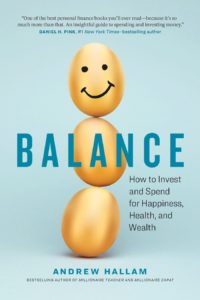Andrew Hallam’s new personal finance book Balance is unlike any other financial book I’ve read. He uses research to show us how to spend and invest in ways that create a happy and fulfilling life.
He uses vivid stories to illustrate his points that make the book a pleasure to read. There’s a lot more to life satisfaction than just amassing personal wealth and owning fancy toys.
The book opens with the “four quadrants to a successful life”: “Having enough money,” “Maintaining strong relationships,” “Maximizing your physical and mental health,” and “Living with a sense of purpose.”
“I’ve met plenty of conventionally successful people (measured by money and career) who appeared less satisfied than, say, a family of Argentinians traveling through Mexico in a motorhome.”
I’ve had a similar experience seeing many executives with highly successful careers who are divorced and work so much that they do little at home other than eat, slump in front of a television, and sleep.
Stuff vs. Experiences
“What do you value more, your stuff or your life?” This question has meaning for me having grown up with a parent who was a hoarder. However, even non-hoarders often prioritize buying stuff over relationships and avoiding debt. “If we want to live the best lives we can, we shouldn’t normalize credit card debts or auto loans.” “Cars are the greatest personal wealth destroyer.” Research shows that rich people often don’t drive fancy cars; when you see an expensive car, there’s a good chance its owner is in debt.
“Material things rarely boost life satisfaction.” “Spend less money on stuff and more on memorable experiences.” Experiences remain memorable for decades, but the stuff we buy is often quickly forgotten. Some of the worst purchases are the ones we make solely to impress others. “Before purchasing something, … Ask yourself, ‘Would I still buy this if nobody else could see it?’”
The things that affect happiness
Research shows that “we tend to be happier when we earn more than our neighbors.” This leads to the advice to move to a neighbourhood where you have above-average income. Unfortunately, that makes your new neighbours less happy. It would be better if we could all be above such comparisons, but that’s easier said than done.
“Close relationships — far more than money — are the single greatest influence on a happy life.” This resonates with me. When I plan to travel somewhere warm for the winter months, my biggest concern is who I’m traveling with and what social activities we can get involved in. For short trips, it’s good to go somewhere interesting, but for long trips, company trumps location.
“Research suggests we also narrow our social circles as we age.” Focusing on those “we’ve formed deep connections with” works well for a time, but I think it’s a problem when these people start to pass away. I wonder if this is part of the reason why we see so many desperately lonely older people living alone in a big house.
Hallam’s command of research on happiness and life satisfaction and his ability to use it to steer a good path in life are impressive. The broad strokes of his lessons appear solid, but I wonder if some of the specific studies will fall to the widespread reproducibility crisis. For example, there are “several large studies confirming that caring for others helps us live longer.” Isn’t it necessarily the case that healthy people care for the weak? It seems plausible that the causation is in the other direction: healthier people live longer and are more able to care for others. Perhaps the studies’ authors found some way to prove that causation goes both ways to some degree.
Big purchases and budgeting
On the subject of stretching to buy a home, Hallam makes an excellent suggestion: “Ask yourself if you could still afford the mortgage if the interest rate doubled or you were out of work for six months.” I’d change the “or” to an “and.” Too many people sign up for a decade or more of stress when they stretch to buy a house. Renting is not synonymous with failure. It’s possible to rent a nice place and get on with your life’s plans.
“To me, budgets are like diets. Sometimes they work … but they usually don’t.” Hallam advocates tracking your spending with a handy app, but he finds trying to set limits in advance on spending in various categories ineffective. Just knowing how much you spend in each category will drive any needed change.
Investing
“Contrary to what many talking heads on YouTube, On TV, or in financial magazines may lead you to believe, you don’t need to follow the economy or know how to choose the best stocks to buy.” “Banks, insurance companies, and investment firms … are filled with legally sanctioned crooks (and sometimes kind, naïve people).”
Hallam tells an interesting story to illustrate how savings accounts fail over the long- term because of inflation. Many people pine for the days when savings accounts paid higher interest, but the story shows that the same inflation problem existed back in 1980. One illuminating table shows how often U.S. savings accounts beat inflation over 5-year rolling periods from 1972-2020. The answer: none! The best place for long-term savings is stocks and bonds.
“Index funds are part of financial literacy.” “If you learn to invest effectively, you could enjoy your chosen career instead of selling your soul for a higher-paying position you hate.”
Advisors and their Anti-Index Battle Plan
One of my favourite sections is “Financial Advisors and Their Anti-Index Battle Plan.” It shreds the many practiced arguments the pushers of expensive mutual funds use to persuade people to avoid indexing. The funny thing is that financial advisors seem to believe the things they are trained to say by their organizations. In their own portfolios, “researchers found that they performed almost as badly as their clients. When comparing their performances to an equal-risk-adjusted portfolio of index funds or ETFs, the advisors underperformed by about 3 per cent per year.”
The best plan is to choose some index funds or ETFs, and set some automatic contributions. “The less you think about your investments, the more money you’ll likely make.”
Hallam lays out three choices for index investing: financial advisor, robo-advisor, or do-it-yourself (DIY). Which you choose depends on your skills and interests. He goes on to explain in detail how investors in different countries can succeed with index investing using each of the three approaches.
I enjoyed a story that began with “Do you believe in ghosts?” It explained why new investors should probably choose a slightly more conservative asset allocation than they think they can handle. While I think it’s possible to learn to take market volatility in stride, if you haven’t had a chance to develop this equanimity, Hallam’s advice makes sense.
Social Responsibility
“Buy less of everything. This should improve your happiness, your financial bottom line, and your children’s and grandchildren’s future.” Buying less stuff isn’t just about saving the world; you’ll likely be happier as well.
“The UN Environment Programme has gone on record as saying fashion accounts for 8 to 10 per cent of global carbon emissions.” Wow. It turns out that I’m not a weird-looking old guy dressed in decades-old clothes; I’m an environmentalist.
During the pandemic some airlines offered a “flight to nowhere.” This wouldn’t appeal to me in any way, but some people actually boarded an 8-hour flight that just circled back to the same airport. I like traveling, but it’s the being there that I like, not the flight. It seems that some people disagree. This would be harmless enough if it weren’t for the environmental impact.
Retirement
Numerous studies have shown that good health and working past normal retirement age are correlated. I’ve always been suspicious of the implication that working causes good health. It’s clear that poor health increases the chances of being forced to retire or simply choosing to quit because the work has become difficult. This must be responsible for at least part of correlation findings in studies. I agree that facing new challenges is important, but not everyone needs a boss or paying client to provide such challenges.
“Research suggests that, for most retirees, costs continue to drop as they age.” This is another study I find questionable. It’s true that retirees’ real spending declines, on average, as they age. The numbers don’t lie. However, averages hide a wide range of experiences. Certainly, some retirees spend too much early on and are forced to spend less later. These retirees skew the average. No doubt some spend less by choice. The question is, do you want to model your retirement on data consisting partially of people who screwed up their own retirements? To me this is like saying, “The average Canadian smokes two cigarettes a day, so you should too.” I’d rather model my smoking habits on those who don’t smoke, and my retirement on the set of retirees who didn’t have spending reductions forced on them.
Conclusion
I was only able to give a taste of the important and entertaining topics covered in this book. So many of the ways we earn, save, and spend our money don’t increase our happiness and life satisfaction. Hallam teaches us how to change this for the better.
 Michael J. Wiener runs the web site Michael James on Money, where he looks for the right answers to personal finance and investing questions. He’s retired from work as a “math guy in high tech” and has been running his website since 2007. He’s a former mutual fund investor, former stock picker, now index investor. This blog originally appeared on his site on Jan. 15, 2022 and is republished on the Hub with his permission.
Michael J. Wiener runs the web site Michael James on Money, where he looks for the right answers to personal finance and investing questions. He’s retired from work as a “math guy in high tech” and has been running his website since 2007. He’s a former mutual fund investor, former stock picker, now index investor. This blog originally appeared on his site on Jan. 15, 2022 and is republished on the Hub with his permission.

